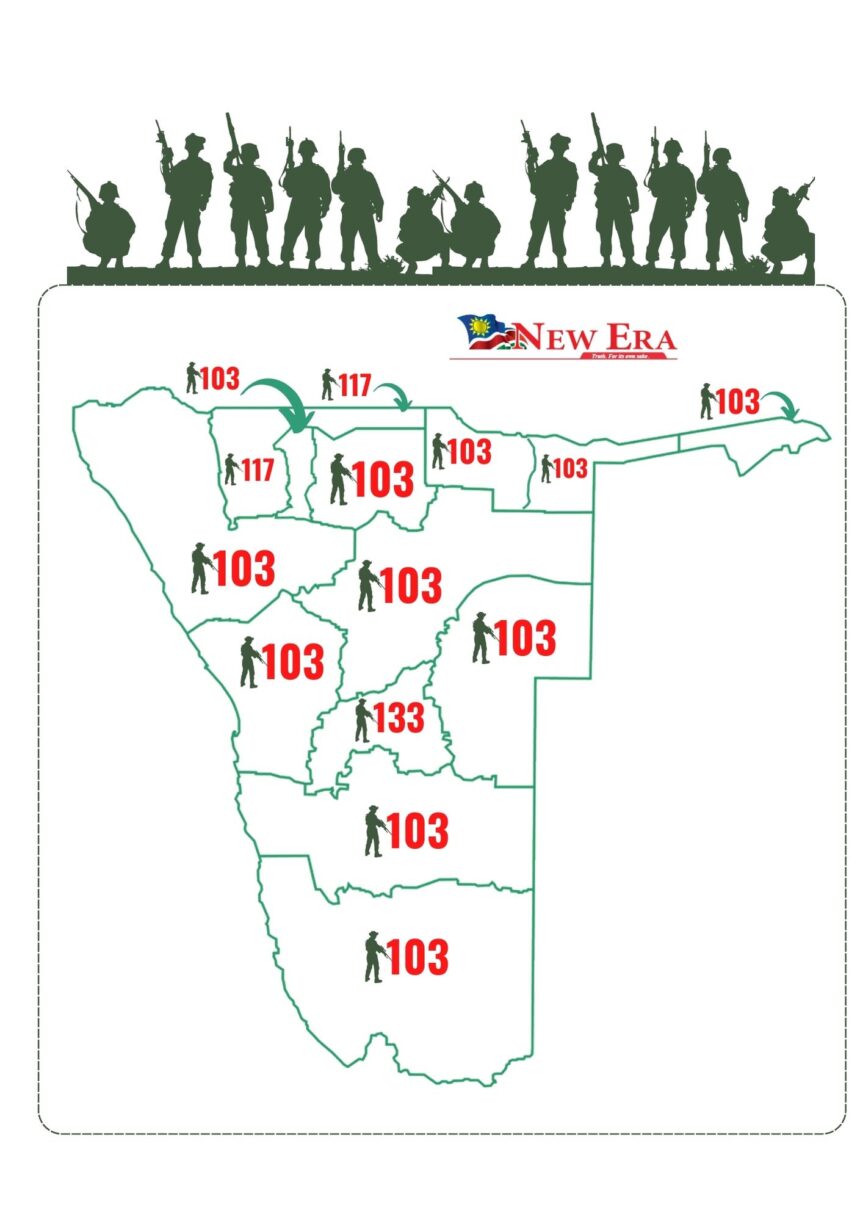The recruitment of over 1 400 new Namibia Defence Force trainees is being lauded in the defence corridors as a representation of a true Namibian army, with each political region securing a minimum of 103 slots.
Only Ohangwena (117), Omusati (117) and Khomas (133) have more cadets from the recent NDF intake.
This is due to special considerations that were used based on their dense populations while the remaining 11 regions each have 103.
The NDF, New Era understands, was deliberate about ensuring that the latest recruitment is a true reflection of the country’s diversity.
This is why the recruitment process was decentralised to each of the 14 political regions and 121 constituencies as opposed to a centralised, one whose outcome would normally be dictated from the headquarters in Windhoek. “In the past, we had challenges [in terms of recruiting]. In order to address these challenges, we decided to decentralise it to local and regional levels so that the people can own the process… the outcome gave us a true representation of the Namibian house,” Fillemon Shafashike, who chaired the recruitment process said yesterday.
The force conducted the entry tests [physical and written] at the same time, “because even if you applied in more than one region, you cannot divide yourself to be at two places at the same time.”
According to him, the force followed President Hage Geingob’s mantra of building an inclusive “Namibian house”.
Over 100 000 Namibians applied to the latest defence intake, with just 57 000 meeting the requirements.
Of these applicants, 3 000 were shortlisted.
In the final round, 1 451 made the final cut.
They reported for training this week.
In the past, the recruitment was directly proportional to each region’s population.
This meant that the more populous a given region is, the more members it would send to the force.
In essence, less populated regions, Hardap with less than 80 000 for example, would only secure less than 20 slots during a given recruitment.
The fortunes changed this year when the NDF recruitment team decided that each region must get an equal share, irrespective of the number of its inhabitants.
According to sources, the force went a step further to ensure that the majority of those being recruited from specific regions, originally hail from those regions.
This was done while taking into consideration that in an independent Namibia, any Namibian can seek employment or settlement in any part of the country, a source said.
It is a model NDF intends to advance and perfect going into the future as it seeks to correct the narrative that the force is mainly reserved for certain ethnic groups, insiders said.
According to Shafashike, other agencies that carry out mass recruitments such as the police or correctional service, can emulate the NDF’s ‘blueprint’.
“It is implementable and can be shared. But there is no perfect strategy, although this gave us the outcome we wanted. We will work on closing the gaps,” he added.
Critics
This year’s recruitment drive was also met with criticism by certain quarters, especially due to the compulsory Covid-19 vaccination and HIV testing requirements for new recruits.
“We had guidelines to prevent wasting public resources. The tests were not just limited to HIV or pregnancy. We even checked if the applicant has all body parts or breathing properly. We had to make sure they don’t have any complications. The training is intense. It requires you to be healthy to avoid catastrophes, even death,” he said.
The high unemployment levels, coupled with a struggling economy did not help either, as some thought the defence would come to their rescue on the employment front.
According to the 2018 labour force survey, Namibia’s unemployment rate stood at 33.4% with a youth unemployment rate of 46.1%, of which men accounted for 43.7% and females for a staggering 48.5%. According to these figures, it is fair to say that every second young woman was unemployed in 2018.
Last year, the UN in Namibia estimated the country’s youth unemployment to be at 50%.
“Many people thought applying meant automatic qualification. But we can only recruit based on the resources provided by government. We cannot take everyone,” Shafashike lamented.
Successful… Some of the new intakes of the Namibian Defence Force.
Photo: MoDVA


